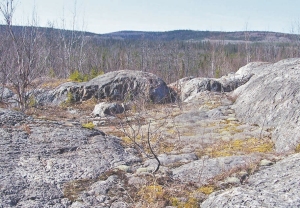The main sulphide gold zones of its 100%-owned Garrison gold property in northeastern Ontario contain an indicated resource of 186,725 tonnes grading 8.06 grams gold per tonne, ValGold Resources (VAL-V) reports.
A new National Instrument 43- 101 report on the Garrison property also tallies an inferred resource of 1.2 million tonnes grading 4.97 grams gold per tonne.
Garrison is situated within the central portion of the Abitibi greenstone belt, which extends from Timmins in Ontario to Chibougamou in Quebec.
The property is 40 km north of the town of Kirkland Lake and 100 km east of Timmins. It also lies 8 km west and on strike with the Holloway and Hold-McDermott gold mines of St Andrew Goldfields (SAS-T).
Rocks in the Abitibi belt include a mixture of Archean-aged, metamorphosed, volcanic, sedimentary and related intrusive rocks, and are host to many of Canada’s most prolific gold and base metal mines.
Mineralization on the Garrison property is made up of disseminated sulphides in silica-flooded zones within altered mafic and ultramafic volcanic rocks, and according to the report, is refractory.
Based on today’s high gold prices, however, the report noted that the fact that it is refractory will not detract from the economics of the project.
The estimates in ValGold’s NI 43-101 report were based on four contiguous zones — named JP, JD, RP, and East — along the Munro fault, a splay from the regional Porcupine- Destor fault.
The indicated resource was based on a maximum 15-metre radius of influence around drill intersection composites. The inferred resource was based upon a maximum radius of influence of 25 metres. A rock specific gravity of 2.8 was used to determine tonnages, the company explained in a press release.
The resource estimates were uncut and in situ, and were calculated on an analysis of cross sections and level plans and by the projection of composited assay intervals onto a vertical longitudinal section.
One of the highlights of the report was the potential of the Garrcon gold zone, which is described as an “excellent exploration target.” The report found that Garrcon held a volume of mineralized rock with the potential to host a deposit in the 20-30-million-tonne range and an in-situ grade potential in the neighbourhood of 1-3 grams for a contained gold potential in the 1-2 million oz. range.
The Garrcon area is about 1,200 metres southeast of the JP zone’s shaft within the Garrcon claim group. Cominco built the Garrcon shaft in the mid-1930s as part of an exploration program and multiple zones of gold mineralization were identified near it.
Drilling in the Garrcon area has shown a fairly widespread area of low-grade gold mineralization, which is non-refractory quartz stringer type.
Since acquiring the Garrison project in July 2005, Valgold started compiling a database on the Munro Fault-hosted zone. A few months later, it launched a 10,000- metre diamond-drill program to test the potential of the JD zone, immediately west of the main JP zone, and to find extensions to the JP zone.
Work on the Garrison property has a lengthy history. A bulk-sampling program on four sub-levels in the central portion of the JP zone kicked off in the 1990s and 50,640 tonnes were shipped to a mill in Quebec. That bulk sample yielded 13,564 oz. gold for an average recovered grade of 8.3 grams gold per tonne.
But exploration on the property dates even further back. In the mid-1930s, Cominco started surface and underground exploration to delineate gold mineralization associated with quartz-pyrite, sediment-hosted veinlets. The company failed to outline an orebody, however, and exploration was called off in 1937.
Major exploration did not start up again until 1985, when Jonpol Explorations teamed up with Cominco in a joint venture. Jonpol drilled more than 76,200 metres of core and bulk sampled the JP zone via a 184-metre vertical shaft and adecline. Metallurgical testing was carried out on the mineralization and resource figures calculated for the five gold zones along the Munro Fault zone.
Apart from its Garrison project, ValGold has active exploration programs in Venezuela and Guyana, which are prospective for gold, uranium, diamonds and base metals.
On the resource news, ValGold closed at 20, up 2 a share, or 11%, on a trading volume of 38,300.
The stock has a 52-week trading range of 18-71 and has 81.9 million shares outstanding.


Be the first to comment on "ValGold files resource on Garrison gold property"